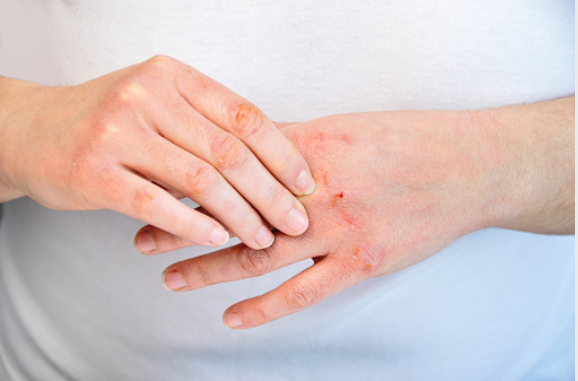
Without a doubt, eczema is an annoying condition that causes a lot of inconvenience to the sufferer. But the severity of the problem depends on many factors, and one of them is the location of the rash. In this article, we will specifically talk about hand eczema.
Why Is Eczema On Hands Such a Trouble To Deal With?
Here are the reasons why hand eczema is such a bad boy:
It Causes Social Anxiety
Eczema rashes on the hands can bring a lot of embarrassment to those who have it. The hands are easily visible to other people, and just noticing an unsightly rash can trigger an insensitive question from an observer. This can bring some emotional pain to people with eczema on their hands. (If you’ve experienced this before, then you know exactly what I’m talking about).
Some People Wrongfully Think It’s Contagious
Another issue with hand eczema is that it can elicit unnecessary judgment and preconceived opinions from others. Some people who see a red, bumpy rash on someone’s hands may automatically think that it is contagious, and that the person with the rash should be avoided like the plague.
Of course, eczema is not contagious. It is primarily caused by the body’s hyperactive immune response to allergies and triggering factors. But this very fact doesn’t stop judgmental people from having negative opinions. Shame on them.
It’s Actually Very Irritating
We use our hands most of the time during the day. We use it to work, drive, perform household chores, hold our children, write, type on a computer keyboard, and so on. Having an itchy eczema rash on your hand can impact daily activities and be a major distraction.
Now let’s get to the good part: here are secrets to hand eczema treatment so that the condition doesn’t bother you most of the time:
How To Treat Hand Eczema
Let’s declare war against that annoying, unsightly and itchy rash on your palm, shall we? Here are some ways to do it:
Get Rid Of The Thing That Caused It
As mentioned earlier, eczema or dermatitis is primarily caused by the sufferer’s hyperactive immune response to allergies and irritants. In short, you have to know your “triggers” and get rid of them.
Is it something you touched? Is there a presence of known allergens in your home? Is there an ingredient in the food you ate that caused the flareup? These are just some of the questions you need to ask.
For people who have asthma and hand eczema at the same time, the triggering factors tend to be the same between the two conditions. It is helpful to take note of what triggers your asthma, and avoid those same triggers for eczema.
You may also consult your doctor and request a “patch test” to know which substances and irritants yo are allergic to.
Wash Your Hands Using Fragrance Free Cleanser
When you have an hand eczema flareup, the last thing you want to have are dirty hands. Unwashed hands can be a breeding ground for germs, and can further cause infection on the damaged parts of the skin. Blistering and oozing can happen if your eczema sores get infected. You want to avoid that.
The best way to wash your hands is to use lukewarm water along with fragrance free soap or cleanser. This will ensure that you’ll get the maximum benefit of sanitizing your hands without exposing it to added chemicals. As much as possible, avoid alcohol-based hand sanitizers as well.
Moisturize, Moisturize, Moisturize
An eczema sufferer’s worst enemy is dry skin. To avoid this, make it a habit to moisturize your hands after washing.
You might be asking, “isn’t water enough to moisturize my hands?”
Not quite. Studies show that simply using water can lead to dry skin. As soon water evaporates, it can leave the surface of your skin very dry.
According to the National Eczema Association, the best way to moisturize eczema-troubled skin is to use greasy ointments. Lotions and creams with high water content should be avoided, and oil-based ointments should be used instead. One example of a greasy ointment is petroleum jelly.
How To Manage Hand Eczema Symptoms and Prevent Flareups
Since there is no permanent cure for eczema at this time, it is important to focus on managing its symptoms and preventing major exacerbations. Here are ways to do that:
Protect Your Hands Using Cotton Gloves
Yes, life needs to go on, even when your hand eczema acts up in a major way. If your hands are heavily involved in your daily work or activities, it is best to use cotton gloves for hand protection.
Why cotton gloves? Cotton allows your skin to “breathe” more. Also, cotton can shield your skin against the most common irritants such as dust mites, molds, or dirt. Also, cotton gloves are easily washable and leaves no residue.
Stay Away From Known Triggers
Once your hands are clear of eczema, it is important to stay away from the allergens that caused it to flare up in the past. Keep a record of these allergens and triggers. When eating out, always ask if a substance or ingredient you’re allergic to is present in the menu (or the specific food you ordered).
Avoid Washing Dishes With Your Bare Hands
Unfortunately, dishwashing detergent contains strong substances that will probably do more harm than good to your hand eczema. It could cause blistering on your skin, and the detergent itself could contain irritants.
To avoid flare ups due to dishwashing, it’s best to just invest in a dishwasher. Or you can ask a family member to do the dishes for you.
The Lowdown On Hand Eczema
Hand eczema can be extremely distracting, but it doesn’t need to put your life to a halt. With a combination of using the hand eczema treatment and prevention tips we discussed, you can restore total confidence, social intimacy, and functionality with the use of your hands.
You may also try our #1 recommended hand eczema treatment, available on this website.











Aw, this was an exceptionally nice post. Finding the time and actual effort to create a very good articleÖ but what can I sayÖ I hesitate a lot and don’t seem to get nearly anything done.